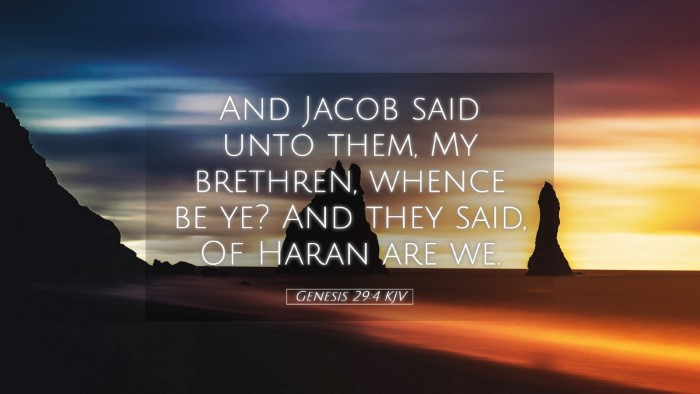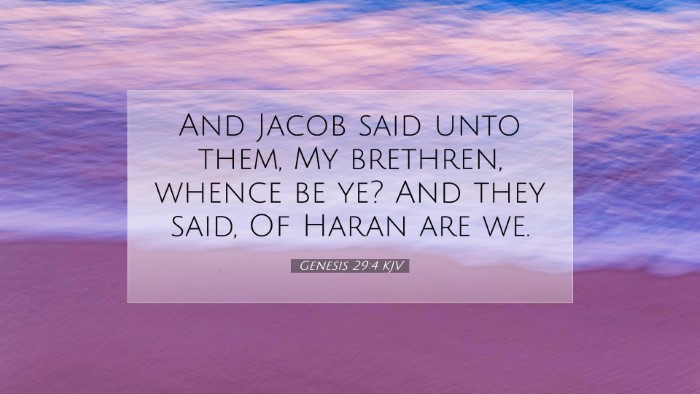Commentary on Genesis 29:4
Verse Analysis: Genesis 29:4 states, “And Jacob said unto them, My brethren, whence be ye? And they said, Of Haran are we.” This verse marks a critical moment in Jacob's journey as it signifies both a physical and spiritual transition in his life.
Contextual Background
The context of this verse falls within the narrative of Jacob’s flight from Esau, his brother, and his subsequent journey to Haran where he seeks a wife from his mother's family. This journey is steeped in the cultural practices of kinship and marriage in ancient Near Eastern society.
Theological Insights
God’s Sovereignty: The events leading Jacob to Haran are seen as a continuation of the divine promise to Abraham and Isaac, which Jacob has just inherited. The commentary from Matthew Henry emphasizes that God's providence is evident in Jacob's encounters, directing him towards fulfillment of His covenant promises.
Significance of Haran: The place name 'Haran' signifies not only the geographical location but represents Jacob’s heritage. Adam Clarke notes that Jacob’s interaction with the shepherds serves as a divine appointment, foreshadowing the establishment of God’s people through Jacob’s future family.
Character Examination
- Jacob: His inquiry, “My brethren, whence be ye?” shows a desire to connect and establish relationship, a theme prevalent in Genesis. He demonstrates awareness of his family's roots, highlighting a sharp contrast to the earlier deception he practiced.
- The Shepherds: Their response provides Jacob not only with information but with a sense of community. Albert Barnes suggests that these shepherds symbolize a collective identity, underscoring the importance of kinship.
Applications for Faith Communities
This passage encourages dialogue and relationship-building within faith communities. Biblical scholars advocate for the importance of questions and the sharing of identity as vital components of a healthy church culture.
Cultural Implications
Rural Life Reflected: The scene reflects the agrarian lifestyle of the time, where shepherds played crucial roles in the preservation of identity and tradition. Matthew Henry elaborates that such communal aspects are essential in understanding the familial blessings manifested through Jacob’s lineage.
Reflective Questions for Study
- How does Jacob's journey to Haran reflect our own journeys of faith towards fulfillment of God’s call?
- What can we learn from Jacob about seeking connection within our community?
- In what ways does understanding our heritage inform our identity as believers?
Conclusion
Genesis 29:4, while simple in its narrative, offers profound insights into relational dynamics, divine providence, and cultural identity. By recognizing the intricacies of this dialogue, pastors and theologians are encouraged to explore deeper meanings that promote spiritual growth and community connection.


